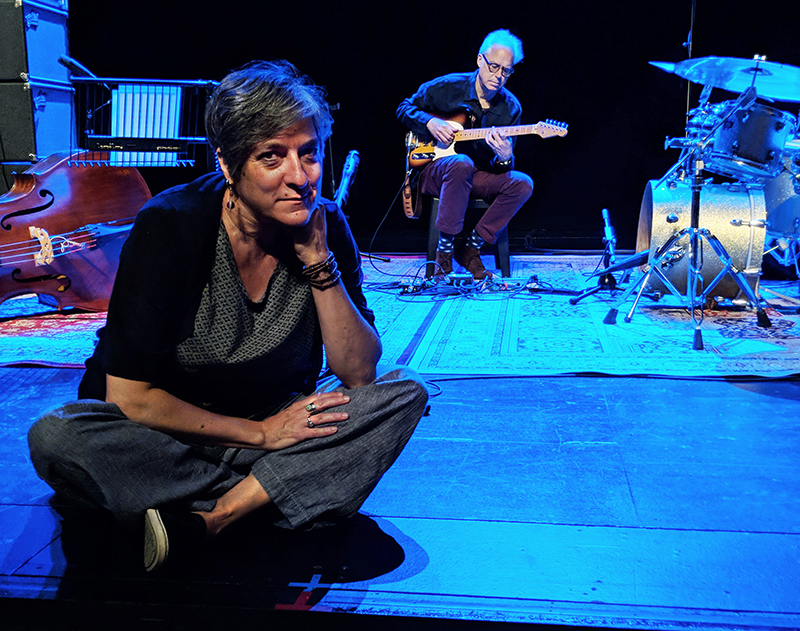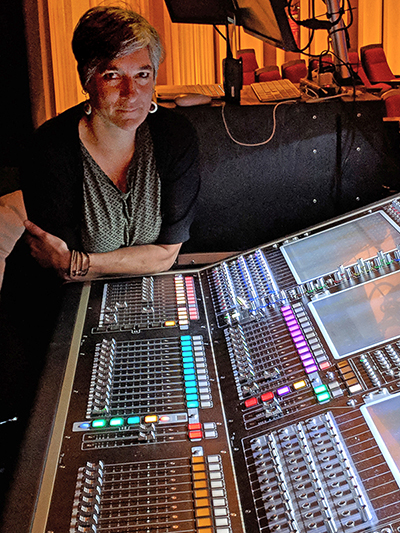
Engelhart employs her own voice to tune systems, working with a Shure SM58 mic, “because every venue has one and it’s a constant that I know, like having my own mics,” she continues. “This is my reference. I basically sing and listen to frequencies that might jump out from other frequencies, and then, in very small increments, lower the frequencies that are bothering me. I don’t know if it’s really scientific, what I’m doing, it’s something I feel. I can smooth out tones that I know will be more present, that I don’t want to hear so much of. Singing the notes is how I do it, and it’s worked for me all these years. Some people use a CD of something they know well as a reference; I use my voice.
Knowing frequencies is super important and being subtle on what frequencies you take away is very important as well. “I don’t want to do too much to a PA because I can back myself into a hole and be left with a PA that’s anemic sounding. There’s a line that can get crossed if I start overcompensating for a bad sounding room or maybe with a PA that’s just not up to par. Some things just cannot be fixed, so I do the best I can with what I have and hope it translates in the end. The spirit of the music always seems to prevail.
“I want my show to run as easily as I can, and tuning the system is the first point of entry, so to speak, where I can get the most work done, so I can focus on balance and sound of instruments rather than working around a PA that’s out of tonal balance,” she says, shifting gears to her mix philosophy.
“For me at FOH, it’s about getting the music from the stage to the audience as naturally and transparently as possible. It’s a creative place, taking all the elements given to me and finding the right sonic placement. I want to hear everything, but it’s also about translating the feeling the music gives. It can be instinctual how I get there.
“I have more liberty at FOH, often times it’s my interpretation of the music. The trust the musicians have in me to translate what they’re doing is so important. It’s a position of performance as much as the band onstage, I think. I try to do the best I can to do the best for the integrity of the music and the musicians.”
She wears foam earplugs on airplanes and trains, and sometimes takes them with her to loud concerts. She has custom fit plugs but doesn’t wear them when mixing. “If it’s too loud for me then it’s too loud for the people around me,” she says. “I also make sure my ears are clean – it’s amazing how bright sound is after you’ve cleaned your ears! It’s basic maintenance; they’re my instrument and livelihood, so I have to keep them in the best possible shape.”
Words Of Wisdom
During a pause in our conversation, I asked if Engelhart has any advice for someone starting out, perhaps even her younger self. After some rumination, she offers, “It’s taken me many years to feel truly confident about what I’m doing. There are so many times I will be second-guessed by local engineers and others about the decisions I’m making, and that has been a test for me.
“I’ve learned to trust my instincts and not be influenced, do what I know deep inside is right. If I start to second-guess myself I usually regret it in the end. Inevitably my first instinct was the right choice, be it the stage setup, mic choices and positions, and how I set up the console to function the way I want it to.

“I was pretty driven when I started – I said yes to every opportunity. I think that helped me a lot; I was put
into situations I probably would never do today. Every experience helped me get deeper into what I’m doing today, and every day is a
new lesson – still!
“Have an open mind, keep learning, and have a good attitude – this is so important. Love what you’re doing. If you’re not happy or liking where you are, then find something that makes you happy. Your attitude reflects in the work you’re doing and everyone around you will respond to that attitude – ‘what comes around goes around’ – is the truth.
“This is a stressful job; it can be thankless, too. People rarely tell you when it’s good but always say something when they think it’s bad. It requires thick skin, and you also have to have good people skills – be patient and polite. I find when I run into a local crew person that’s grumpy or unhelpful, doing the polar opposite of that goes a long way. I can get everything I need done by being polite and nice. They may not know it, but in the end they’ll thank me for the nice day they had. I’ve seen this time and time again – and if they don’t, oh well, it’s their loss.
“Also don’t second-guess yourself; the decisions you make are yours. Stand your ground. To this day there are people questioning my decisions and needs. It’s really frustrating and can be intimidating too. I have to be strong and stand by what my choices are. Everyone thinks they know more than you do. Remember not to let them influence you. I always take into consideration what they might suggest, but in the end it’s my decision, not theirs, and that’s what I go by.
“Finally – and most importantly – have fun!”
